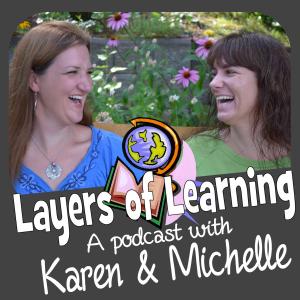Layers of Learning

Episode 31: Diving Deep
The Layers of Learning Podcast with Karen and Michelle is here to help you get your whole family learning together in your homeschool. We are the sisters behind Layers of Learning. We love getting together to chat about homeschooling and this podcast is just a series of our chats. We’re inviting you to listen in on our conversations.
We both have big families, but we teach almost all of our school subjects to everyone at once, and we want to help you find the joy in that too, so we talk a lot about family homeschooling. To see all of our episodes, visit our Layers of Learning Podcast Page. Join us as we explore how to have a happy, hands-on, family-style homeschool.
Diving Deep This is Karen’s son, Tyler, and her husband, Bob. Although Karen and Bob have been diving in the ocean for years, they still go back to the pool as their kids learn to dive. The same is true with history. Your kids will start in the safety of surface-level learning and then you can help them progress to an ocean of knowledge as they mature.Michelle and Karen discuss how to dive deeply into history in this episode of the podcast. You’ll hear about how learning to scuba dive with her husband, Bob, helped Karen realize just how little she knew about the world up until then; even though she had been an avid swimmer her whole life, she had only been on the surface. Learning to scuba dive in a swimming pool changed everything. Soon, her scuba gear took her to the ocean and a whole new world she had never known. As we dive deeper into history, our views of our world will change and we can experience things we only thought we knew of before.
In this episode, Michelle and Karen speak about all kinds of controversial topics, from slavery and the Vietnam War to Christopher and feminism. Listen in to see how diving deeply into history has informed their perspectives of the story of our world.
Here Are A Few Topics You’ll Hear About In This Podcast:- Scuba diving helped Karen realize just how limited her view of the water had been throughout her life. Her limited view of history was the same.
- Christopher Columbus is a prime example of surface-level learning. In recent years people have chosen sides – Christopher Columbus is either seen as a hero or a villain. Most people only learn about this controversial figure on a surface level. The truth is much more complex and can teach us a lot if we are willing to dive more deeply into his life and history.
- Be widely read. Furthermore, learn the context of history, people, cultures, and stories. Don’t just read something online or from one source and feel like an expert. Instead, compare sources, sift out skewed points of view, and spot biases and inconsistencies. Use primary sources whenever possible.
- Recognize that even as you study deeply, you still have a limited view of the topics you research. Even though Karen scuba dives in the ocean, the percentage she has seen is tiny. Likewise, our view of history has the same limited scope. For example, slavery is an issue that has often been taught with a very limited scope. As you explore more sources and more points of view, you will likely discover stories and sides of slavery that you didn’t know existed.
- Be wary of information from just any source. Be skeptical and verify the information you are researching. Watch for universal statements, oversimplified stories, and blanket statements.
- Don’t fall into the blindness of judging people and events by our modern worldview. Mores change over time. We all live in a manner that we are somewhat blind to the perspectives of other people, places, and times.
- Don’t be afraid to dive deeply into history. Expanding your perspective might just change your worldview for the better and teach you some real ways to learn from history that will matter in your life.
Click the Play button to hear the podcast, then subscribe below!






 Visit Podcast Website
Visit Podcast Website RSS Podcast Feed
RSS Podcast Feed Subscribe
Subscribe
 Add to MyCast
Add to MyCast